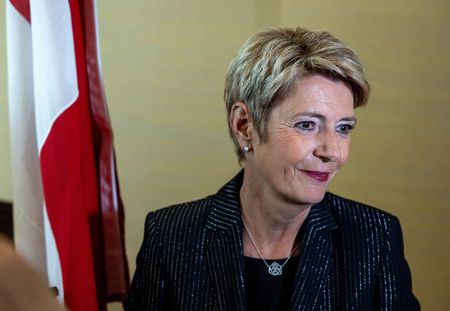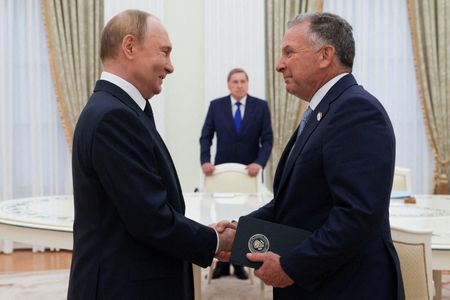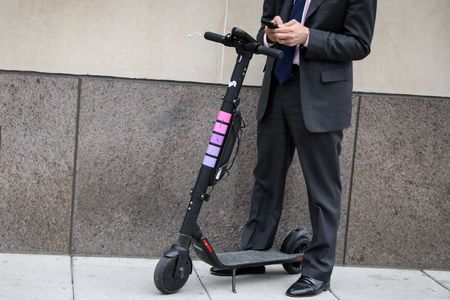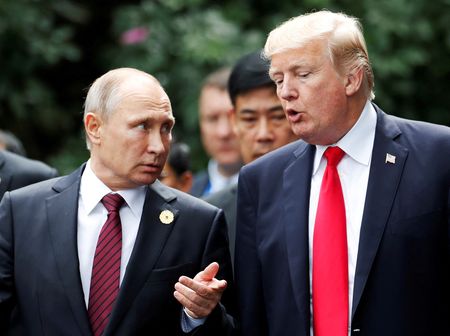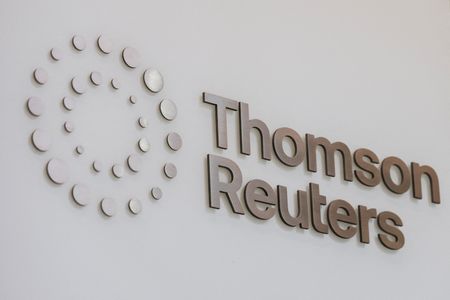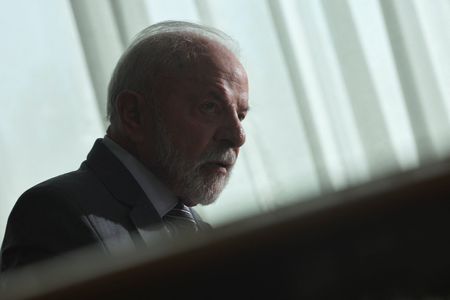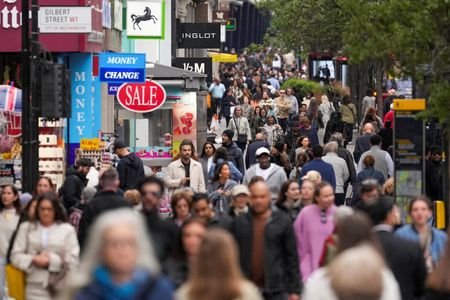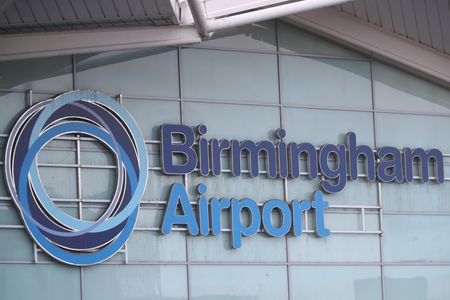By John Revill and Andrea Shalal
WASHINGTON/ZURICH (Reuters) -Swiss President Karin Keller-Sutter left Washington empty-handed on Wednesday after a hastily arranged trip to avert a crippling 39% tariff on the country’s exports to the United States, its biggest market, three sources familiar with the matter said.
Keller-Sutter said she had a “very good meeting” with U.S. Secretary of State Marco Rubio, but one of the sources said she did not meet with U.S. President Donald Trump or any of his top trade officials.
The Swiss president had been seeking a tariff rate of 10%, which U.S. officials rejected, the source said, adding that most countries are facing much higher tariff rates and reducing the U.S. trade deficit remained Trump’s goal.
Washington is potentially seeking more energy and defense exports to Switzerland, according to a Swiss source familiar with the discussions. In return, the Swiss are looking for lower duties on goods sold into the U.S., a leading buyer of Swiss watches, machinery and chocolate.
Trump announced a tariff rate of 31% for Switzerland in April as part of a broad push to reorder global trade, but increased the threatened tariff to 39% last week.
“We had a very good meeting today. We had a very friendly and open exchange,” Keller-Sutter told reporters after the meeting at the State Department in Washington. She did not answer a question about what further offers Switzerland would make. The higher tariff is due to take effect on Thursday.
On social media, Keller-Sutter later wrote that she and Rubio had discussed bilateral cooperation, the tariff situation and international issues.
The Swiss delegation was preparing to leave Washington without a deal on Wednesday, a source close to the Swiss delegation said, with the country’s cabinet due to hold a meeting on Thursday or Friday.
“We came over with the intention of presenting new ideas to the American administration to resolve the tariffs matter, which we have done,” the source said. “We are ready for negotiations to continue.”
Switzerland was stunned by Trump’s decision last week to apply the steep rate – among the highest announced since he launched his global trade reset – which threatens to inflict major damage on its export-orientated economy.
Keller-Sutter and Business Minister Guy Parmelin flew to Washington on Tuesday for last-minute negotiations aimed at reducing the tariffs before they go into effect on Thursday.
Additional talks are possible, even after the higher rate takes effect, the first source said.
Parmelin had already raised the possibility of Switzerland buying U.S. liquefied natural gas to help secure a better deal.
Under a deal the EU struck with Washington last month to secure a 15% tariff rate, Brussels agreed to buy $750 billion worth of LNG, oil, and nuclear energy products over the next three years.
While the EU made no formal pledge to buy more U.S. arms, it did indicate to U.S. negotiators that U.S. suppliers would benefit from an increase in defence spending in line with higher NATO commitments agreed under pressure from Trump.
Both concessions, along with a pledge to invest more in the U.S., were seen as important in clinching a deal, said a person familiar with the U.S.-EU negotiations.
Switzerland already purchases some military hardware from the U.S. and has placed a 6-billion-franc ($7.43-billion) order to buy Lockheed Martin F-35A Lightning II fighter jets.
While the Swiss government is focused on sweetening its offer to Washington and says it is not planning countermeasures against the U.S. tariffs, some Swiss politicians have called for the F-35 deal to be scrapped over the trade dispute.
LOOMING ECONOMIC HIT
Earlier on Wednesday, Keller-Sutter and her team met with Swiss business leaders including Roche Chairman Severin Schwan as well as Alfred Gantner and Marcel Erni, founders of Swiss private equity firm Partners Group.
The group, which also included Daniel Jaeggi, president of global energy and commodity firm Mercuria, spoke about the tariffs situation, the government said, without giving further details.
Further meetings are planned with executives from other Swiss companies present in the United States. Business associations warn that tens of thousands of Swiss jobs are at risk if the 39% tariffs are implemented.
Swiss cheese producers, for example, are bracing for a steep drop in sales in the United States, which bought 11% of cheese exports like Gruyere and Emmentaler last year.
“The taxes are enormous,” said Anthony Margot, a fifth-generation cheese maturer. “We can’t replace a market like the United States overnight.”
The blue chip Swiss Market Index was down 1% in early afternoon trading on Wednesday.
Following talks with Treasury Secretary Scott Bessent and U.S. Trade Representative Jamieson Greer, Switzerland had agreed a draft statement with the United States in early July that was reported to include a 10% tariff rate.
Trump’s U-turn on Friday, however, followed what some U.S. officials said was a fraught telephone call with Keller-Sutter. Swiss sources said the call was not a success, but denied there was a falling out between the two leaders.
Keller-Sutter did not meet with Greer, Bessent or Commerce Secretary Howard Lutnick during her visit this week, the first source told Reuters.
($1 = 0.8080 Swiss francs)
(Additional reporting by Dave Graham and Manuel Ausloos; Editing by Miranda Murray, Joe Bavier and Nia Williams)

